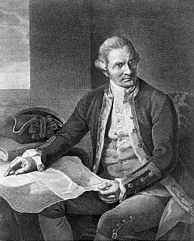
Cook’s language has attracted interest for a variety of reasons.
As a government-supported explorer in the early days of the British empire, Cook was involved in the spread of the English language beyond the British isles. Recent studies of Cook by authors like Carter, Currie, and MacLaren have considered the functi ons of his writing in the conquest and colonization of Australia and Canada.
Cook’s voyages brought new words into the English language, as Gray’s article attests. New species like the kangaroo taxed contemporary practices of scientific taxonomy. Ellis ("Tails of Wonder") and Percy have independently described the efforts of Cook and the gentleman scientist Joseph Banks to describe and to classify the kangaroo.
Studies of Cook’s writings demonstrate linguistic prescriptivism in
practice. Politics and public interest prompted the official publication
of the records of Cook’s three voyages. Publishing in an age of
prescriptivism, the self-educated Cook had to be seen to write correctly.
The manuscripts of his voyage journals were edited by John Hawkesworth
(voyage 1) and John Douglas (voyages 2 and 3). McIntosh and Percy have
compared Cook’s grammar with that of his editors, and early Cook with the
later Cook—whose language became noticeably more correct.
online resources
- The
voyages of Captain Cook in the global eighteenth century: UCLA
exhibition catalogue
Succinct account of Cook's voyages and their contexts.
- The Captain Cook Society homepage
biography
- Beaglehole, J.C. The Life of Captain James Cook. Volume 4 of the series The Journals of Captain James Cook on His Voyages of Discovery. London: The Hakluyt Society, 1974.
- Hough, Richard. Captain James Cook: a biography. London: Hodder & Stoughton, 1994.
writings (and bibliography)
- Cook, James. The Journals of Captain James Cook on His Voyages of Discovery, ed. J.C. Beaglehole. Cambridge and London: for Hakluyt Society by the University Press, 1955-1974.
language
- Carter, Philip. "`An Outline of Names'." In The road to Botany Bay. An essay in spatial history, 1-33. London and Boston: faber and faber, 1987.
- Currie, Noel Elizabeth. "Captain Cook At Nootka Sound and Some Questions of Colonial Discourse." Ph.D. thesis, University of British Columbia, 1994.
- ________. "Cook and the Cannibals: Nootka Sound, 1778." Lumen (Selected Proceedings From the Canadian Society of Eighteenth-Century Studies) 13 (1994): 71-8.
- Ellis, Markman. "Tails of Wonder. Constructions of the Kangaroo in Late Eighteenth Century Scientific Discourse." In Science and exploration in the Pacific. European voyages to the southern oceans in the eighteenth century, ed. Margarette Lincoln. Boydell Press in association with the National Maritime Museum, 1998.
- Gray, Douglas. "Captain Cook and the English Vocabulary." In Five hundred years of words and sounds. A festschrift for Eric Dobson, eds. E.G. Stanley and Douglas Gray, 49-62. Cambridge: Brewer, 1983.
- McIntosh, Carey. Common and Courtly Language. The Stylistics of Social Class in 18th-Century English Literature. Philadelphia: University of Pennsylvania Press, 1986.
- Percy, Carol. "In the Margins: Dr Hawkesworth's Emendations to the Language of Captain Cook's Voyages." English Studies 77, no. 6 (1996): 549-87.
- Percy, Carol. "Variation Between -(E)Th and -(E)S Spellings of the Third Person Singular Present Indicative: Captain James Cook's Endeavour Journal, 1768-1771." Neuphilologische Mitteilungen 92, no. 3 (1991): 351-8.
- Percy, Carol. "The Verb Shoalden in Captain James Cook's Endeavour Journal, 1769-1771." Notes and Queries 39, no. 1 (1992): 68-70.
- Percy, Carol. "Grammatical Lapses in Dr John Hawkesworth's Voyages (1773)." Leeds Studies in English 26 (1995): 145-68.
- Percy, Carol. "Eighteenth Century Normative Grammar in Practice: The Case of Captain Cook." In English historical linguistics 1994. Papers from the 8th international conference on English historical linguistics (8 ICHEL, Edinburgh, 19-23 September 1994), ed. Derek Britton, 339-62. Amsterdam and Atlanta: John Benjami ns, 1996.
- Percy, Carol. "`To Study Nature Rather Than Books': Captain James Cook As Naturalist Observer and Literary Author." Pacific Studies 19, no. 3 (1996): 1-30.
- Percy, Carol. "Erratum: Captain Cook As Navigator and Narrator: A Reappraisal." Pacific Studies 20, no. 1 (1997): 162-3.